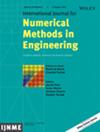对“一种广义的单步多阶段时间积分公式和具有更高稳定性和精度的新设计”的修正
IF 2.9
3区 工程技术
Q1 ENGINEERING, MULTIDISCIPLINARY
International Journal for Numerical Methods in Engineering
Pub Date : 2025-08-25
DOI:10.1002/nme.70112
引用次数: 0
摘要
在本文中,我们描述了对IJNME(2025)126:e7658发表的广义单步多阶段时间积分框架的修正。这一修正不会改变本文的任何数值分析和结论。然而,这是必要的,因为数值实现可能会被误解。本文章由计算机程序翻译,如有差异,请以英文原文为准。

A Correction to ‘A Generalized Single-Step Multi-Stage Time Integration Formulation and Novel Designs With Improved Stability and Accuracy’
In this note, we describe a correction to the generalized single-step multi-stage time integration framework published in IJNME(2025)126:e7658. The correction does not change any numerical analysis or conclusions in the paper. However, it is necessary, as the numerical implementation might be misunderstood.
求助全文
通过发布文献求助,成功后即可免费获取论文全文。
去求助
来源期刊
CiteScore
5.70
自引率
6.90%
发文量
276
审稿时长
5.3 months
期刊介绍:
The International Journal for Numerical Methods in Engineering publishes original papers describing significant, novel developments in numerical methods that are applicable to engineering problems.
The Journal is known for welcoming contributions in a wide range of areas in computational engineering, including computational issues in model reduction, uncertainty quantification, verification and validation, inverse analysis and stochastic methods, optimisation, element technology, solution techniques and parallel computing, damage and fracture, mechanics at micro and nano-scales, low-speed fluid dynamics, fluid-structure interaction, electromagnetics, coupled diffusion phenomena, and error estimation and mesh generation. It is emphasized that this is by no means an exhaustive list, and particularly papers on multi-scale, multi-physics or multi-disciplinary problems, and on new, emerging topics are welcome.

 求助内容:
求助内容: 应助结果提醒方式:
应助结果提醒方式:


